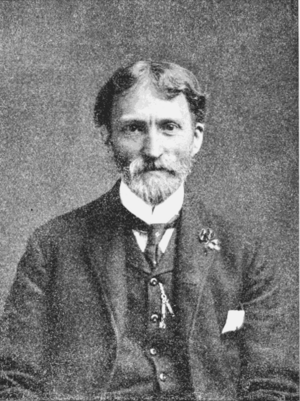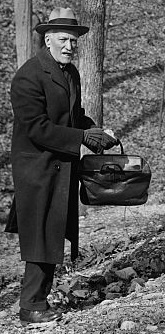Walter Hough facts for kids
Quick facts for kids
Walter Hough
|
|
|---|---|

Walter Hough in 1904
|
|
| Born | 1859 Morgantown, West Virginia, United States
|
| Died | 1935, aged approximately 76 |
| Citizenship | American |
| Alma mater | West Virginia Agricultural College, West Virginia University |
| Awards | Order of Isabella |
| Scientific career | |
| Fields | Ethnography, archaeology |
| Institutions | Smithsonian Institution |
| Influenced | Paul Sidney Martin |
Walter Hough (1859–1935) was an American scientist who studied different cultures and peoples. He worked at the famous Smithsonian Institution, a group of museums and research centers in the United States. He was known for his work in ethnology, which is the study of human cultures, and archaeology, which is the study of human history through digging up old sites.
Contents
Early Life and Education
Walter Hough was born in 1859 in Morgantown, West Virginia. He went to school at Monongalia Academy and then attended West Virginia University. He earned his first degree in 1883 and later received his Ph.D. in 1894. His education helped him prepare for a career exploring and understanding ancient cultures.
Working at the Smithsonian
Hough started working at the Smithsonian National Museum of Natural History in 1886. He began as an assistant and later became an assistant curator of ethnology in 1896. A curator is someone who manages and organizes a museum's collections. By 1910, he became a full curator, a position he held until he passed away in 1935.
His main job was to organize and catalog the many items in the museum's collections. These items helped people learn about different cultures from around the world.
Exploring the American Southwest
Even though much of his work was in the museum, Walter Hough also spent time doing field work. He traveled to the American Southwest to explore archaeological sites. This meant he would dig up places where ancient people used to live to find artifacts and learn about their lives.
In 1905, Hough made an important discovery in a cave in New Mexico. He found well-preserved corn cobs. This discovery was very helpful for other archaeologists. It helped them figure out that the Mogollon people lived in that area before the Anasazi Puebloans. Before this, many thought the Anasazi were the first people to live there.
International Recognition
In 1892, Walter Hough was honored with a special award called the Knight of the Order of Isabella. He received this award in Madrid, Spain, while he was part of a United States Commission. He also joined Dr. J. Walter Fewkes on an expedition to Arizona between 1896 and 1897, continuing his important research.
Images for kids
 | Sharif Bey |
 | Hale Woodruff |
 | Richmond Barthé |
 | Purvis Young |




